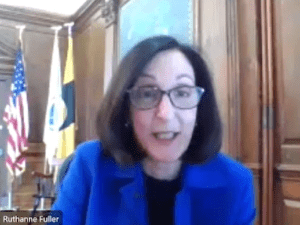Who is a member?
Our members are the local governments of Massachusetts and their elected and appointed leadership.

Newton Mayor Ruthanne Fuller testifies during the March 15 Joint Ways and Means Committee hearing on education funding and local aid.
On March 15, the MMA testified before the Legislature’s Joint Committee on Ways and Means on key municipal priorities for the fiscal 2023 state budget, leading with its case that unrestricted local aid should better reflect the historic state tax collections of the past few years.
The MMA is strongly advocating for a larger increase in Unrestricted General Government Aid, the state’s main revenue-sharing mechanism, than the 2.7% that Gov. Charlie Baker proposed in his fiscal 2023 budget bill.
“Communities are facing a much tighter budget picture than the state” in fiscal 2023, said MMA Executive Director and CEO Geoff Beckwith. “This is a critical time for communities.”
Joining Beckwith at the hearing was MMA President and Newton Mayor Ruthanne Fuller, who said a 2.7% local aid increase “doesn’t keep up with inflation,” which is already straining local budgets.
“We’re looking at layoffs this year,” she said. “We need your help.”
Beckwith pointed out that fiscal 2023 state tax collections are forecasted to be $2.5 billion higher (7.3%) than the tax base that was used to pass the fiscal 2022 budget last July, and state tax collections have increased by $6.32 billion (21.3%) since fiscal 2020.
Beckwith said the governor’s budget (known as House 2) uses a recently upgraded revenue estimate for fiscal 2022, rather than the one used in the state budget as enacted, “leading to an artificially low growth projection” that fails to share the higher-than-expected revenue growth with cities and towns. He said the past two years have seen an “unprecedented divergence” between the growth in state revenues and local aid.
The MMA is urging the Legislature to use the fiscal 2022 state budget figure as the base, which would increase the UGGA account by $85.3 million (7.3%), rather than the $31.5 million in the governor’s budget plan.
Cities and towns face rapidly rising costs and a tight cap on property taxes under Proposition 2½, Beckwith said, so they rely on “predictable and adequate state revenue sharing” to provide essential local services, ensure public safety and maintain vital infrastructure.
Chapter 70
The governor’s budget would fulfill commitments in the Student Opportunity Act by increasing Chapter 70 school aid by $485 million to $5.98 billion, but 136 of 318 operating districts (43%) would receive only the minimum per-student increase of $30, providing those districts with a Chapter 70 increase of about 1%.
Mayor Fuller said the governor’s Chapter 70 proposal would amount to just a 1.88% increase in Newton.
“We’re going backwards this year,” she said.
The MMA continued its strong advocacy for minimum aid of $100 per student to ensure that all districts can at least keep pace with inflation and maintain their school services.
Special education circuit breaker
The MMA expressed support for the governor’s proposal to add $41.2 million to fund the Special Education Circuit Breaker program at $414 million, an increase of 11%. The Student Opportunity Act expanded the special education circuit breaker by including out-of-district transportation, an important enhancement for cities and towns.
Charter schools
The governor’s budget would increase the charter school reimbursement account to $219 million, intended to meet the commitment in the Student Opportunity Act to fund 90% of the state’s statutory obligation to mitigate Chapter 70 losses to charter schools.
The MMA argued, however, that charter schools continue to divert a high percentage of Chapter 70 funds away from many municipally operated school districts, and place increasing strain on the districts that serve the vast majority of public schoolchildren. The MMA reiterated its call for comprehensive charter school finance reform.
School transportation
Beckwith pointed out that House 2 would reduce funding for regional transportation reimbursements from $82.1 million in the current fiscal year to $77.8 million, which would create a hardship for virtually all communities in regional districts. Reimbursements for transportation of out-of-district vocational students remains significantly underfunded at $250,000.
The governor’s budget would increase reimbursements for the transportation of homeless students under the federal McKinney-Vento Act from $14.4 million this year to $22.9 million in fiscal 2023.
PILOT
The governor’s budget would level-fund payments-in-lieu-of-taxes at $35 million, which, the MMA pointed out, would create a significant hardship for many smaller, rural communities with large amounts of state-owned land. This is a key account due to the major impact that PILOT payments have on budgets in very small communities, and level-funding this account would fall short of the Legislature’s goal of phasing in full funding by fiscal 2024.
Budget process
The MMA urged legislators to announce an agreement as soon as possible on the two main local aid accounts — UGGA and Chapter 70 — which would be tremendously helpful to the municipal budget planning process.
The Joint Ways and Means Committee concluded its budget hearings in mid-March. The House is expected to debate its budget bill in April, with the Senate deliberating its own bill in May. The Legislature will work to get a final budget bill to the governor by the beginning of the fiscal year on July 1.